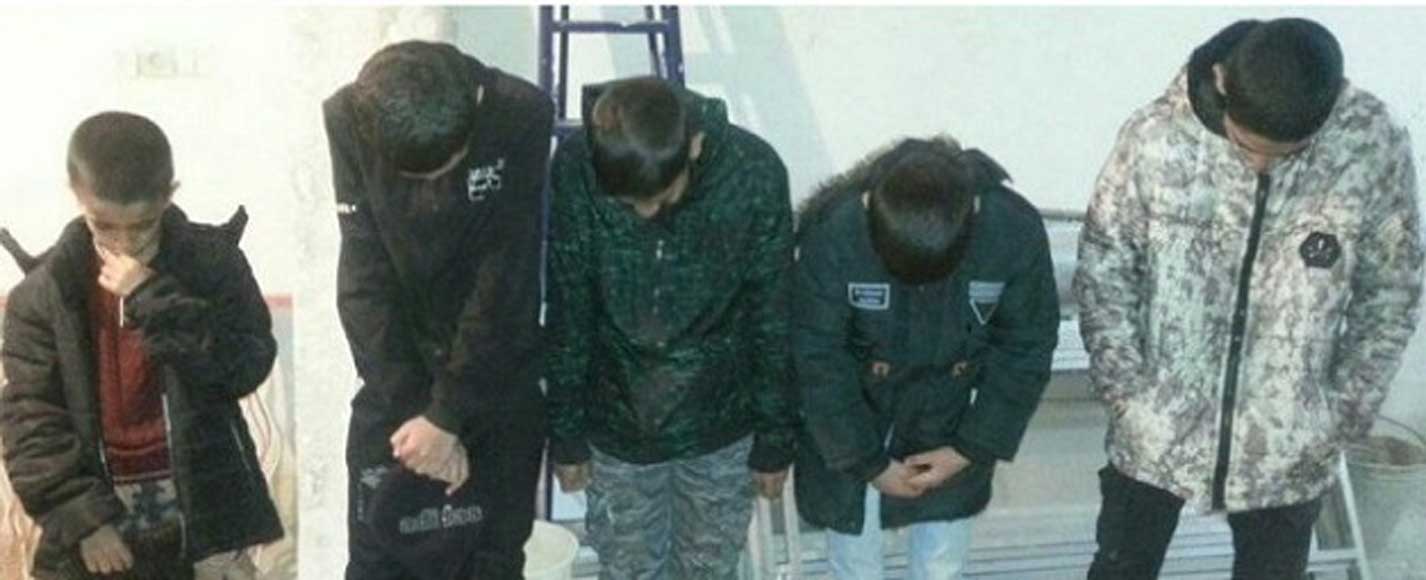January 26, 201
The recent arrest of a group of underage street peddlers by the authorities in the city of Borujerd [capital of the western province of Lorestan] has drawn sharp criticism from the public. Many people in Borujerd have been outraged by the publication of photographs of the children on the Telegram channel of the mayor’s public relations office. The incident has once again drawn attention to the plight of underage street vendors.
The photographs were quickly taken down by the mayor’s office, which also issued a public apology. The five young boys whose pictures were posted on social media reportedly sold candies in the streets of Borujerd. Twitter users expressed their anger at the authorities by posting their comments under the hashtag #child-candy-sell-not guilty.
Many people lambasted the authorities for harassing children instead of tackling serious crimes. “Arrest the real criminals, I mean the embezzlers,” one tweet said. Another person wrote: “Children who sell candy have not committed any crime. They don’t deface the city. Despair, poverty and the prospects of a bleak future are what turns our cities ugly.” Another tweet said: “Imprisoned underage street peddlers, social injustice, suicides, and unpaid workers are the true horrors plaguing our society.” A tweet by a child protection group said: “Publishing pictures of these underage boys clearly violates Article 3 of the United Nations Committee on the Rights of the Child (CRC) Convention.”
In an open letter to Masoumeh Ebtekar, the Vice President for Women and Family Affairs, Mahnaz Afshar, an Iranian actress and a children’s rights campaigner, severely criticized the arrest and treatment of the five underage street vendors. The letter said: “The inhumane treatment of these children by the city of Borujerd is appalling. These underage boys, whose livelihood depends on selling candies, were arrested, lined up and photographed like common criminals. This was just another way of humiliating these poor souls who have been victimized all their lives. We are all responsible for these children. We are all guilty of creating situations which have forced these young boys to peddle goods in the streets.”
City and provincial officials have been quick to blame each other for the fiasco. Borujerd Governor Ali Kouranifar told reporters that he was not involved in the decision to round up these young boys. He placed the blame squarely at the doorstep of the Borujerd City Hall. Meanwhile, Borujerd’s deputy mayor promised to discipline officials at the public relations office for posting the photos, thereby deflecting criticism from the City Council.
Shifting to damage-control mode, the director of the mayor’s public relations office, Davoud Gudarzi, explained: “These five boys were brought to Borujerd from Malayer [central Hamadan Province] and dispatched to different parts of the city. Our aim was to arrest the ringleader who exploits these children. But after two weeks of investigation, we couldn’t capture him. So, in an effort to protect them, we collected these young boys and brought them to the City Hall. We treated them with utmost care. We posted their photographs on social media in the hope of reuniting them with their families. Someone finally came and took them.”
Reza Behnudfar, deputy head of Borujerd City Council, told the Tasnim News Agency: “The director of the mayor’s public relations office was summoned for questioning. But members of the council didn’t find the explanation satisfactory. So we are planning to take legal action.”
Handing over those five children to someone who claimed to be their legal guardian without properly vetting the person has raised many eyebrows. Addressing the issue, the director of the mayor’s public relations office told ILNA [Iranian Labor News Agency]: “The individual in question left his ID with us. He claimed to be a family friend of those children. We released the children to his care. His ID and documents are at the City Hall. I must stress that none of the five boys were ever jailed. They could have left at any time. They, however, decided to remain at the City Hall because they feared the master criminal who exploited them.”
Fariba Derakhshaniya, director of the Welfare Office for Victim Protection, said: “Provincial authorities should investigate gangs who transport minors between provinces for the explicit purpose of using them to work the streets.”
Meanwhile, Hadi Shariati, deputy director of the Association for the Protection of Children’s Rights, said: “The treatment of children in our country has been a source of grave concern for many years now. The recent incident in Borujerd is an example of how the rights of the most vulnerable segment of our society are routinely violated.” He added: “We recently experienced nationwide protests prompted by the country’s dire economic conditions. Abject poverty and despair have forced these poor children to sell candy in the city streets. This is a painful tragedy. It is sad that these children have been treated as common criminals. It would appear that instead of battling poverty we are fighting the poor.”
In a letter to Iranian Labor Minister Ali Rabiei, the Imam Ali Group of Workers, Network of Children and Street Children said: “Current labor laws don’t prohibit children from selling goods in the streets. They shouldn’t, therefore, be arrested. If a child is forced to work in the streets, then his or her parents should be held responsible.”
A bill was introduced in the Majlis [Iranian Parliament] in 2017 which, if passed, would have allowed the authorities to remove beggars, including children, from the streets. However, it faced fierce opposition in the Majlis and by children’s rights groups. The bill is currently being reviewed, and the revised version will be submitted to the Majlis in the near future.
There is no accurate data regarding the number of underage street workers. While some studies put the figure at two million, children’s rights groups, assert that up to seven million children peddle goods in streets. The number will most likely continue to rise in view of the economic crisis.









